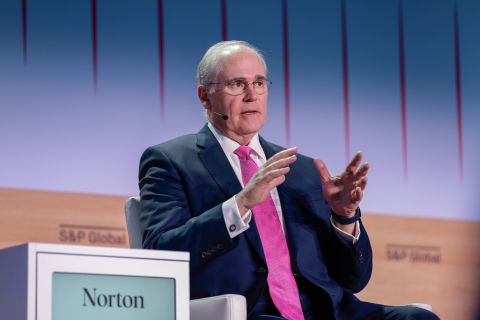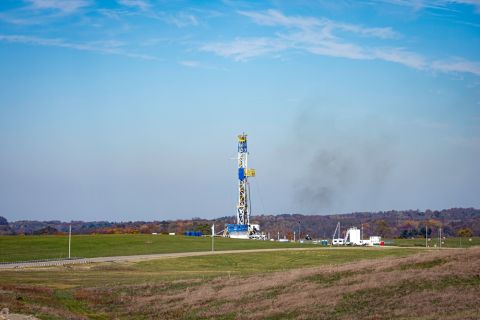On September 11, Peter Quick, the president of the American Stock Exchange, was just finishing a morning meeting with the exchange's board of governors in the firm's 86 Trinity Street building in the heart of New York's financial district. Then it happened. "We heard a terrific, loud noise, then felt a concussion that rattled our building," he says. "We looked out the window and saw, 100 yards north, smoke coming from One World Trade Center. The smoke swirled southward past Two World Trade Center, along with debris and office papers that rained down not only on our rooftop, but also on the graveyard next to Trinity Church across the street. Some office papers actually landed across the East River in Brooklyn. The force of the explosion was that great." With so much smoke, Quick and Salvatore Sodano, the exchange's chairman, immediately shut down the building's air conditioning system. Then the second plane hit the south tower. On an internal line to the Securities Exchange Commission, other market participants and clearing organizations, the two indicated that the Amex would not be opening that morning. They also began the evacuation of Amex people from the building. "Sal and I had just stepped outside when the south tower collapsed," says Quick. "At first, there was just a low rumble, then the noise grew louder. We stepped back inside the building and the street went completely black. Police and firemen streamed into the lobby. Covered with soot or gray ash from head to toe, they were barely recognizable. Later upstairs, as we were recovering our briefcases and cell phones, the north tower came down with the same rumble and vibration, again shaking our building. We retreated to the basement to plan for the next day." With electricity out by nightfall, phone- and data lines down, and extensive damage to its 22 Thames Street staff building next door, the exchange had a problem. How, when and where to reopen? With great assistance from the New York Stock Exchange, the Philadelphia Stock Exchange and the Security Industry Automation Corp., it opened for equities trading on a floor of the NYSE the following Monday, says Quick. "Meanwhile, the Philadelphia exchange allowed our specialists and marketmakers to go down there to conduct business. That's how we stayed up and running during the next few weeks. Through it all, we maintained our market share in equities trading, with only a minor hit to our exchange-traded funds (ETFs), which are akin to mutual funds, except they're tax-advantaged. It was one of the finest examples of the U.S. financial community pulling together to help one of its own." On the morning of October 1, the Amex reopened for trading in its magnificent 80-year-old Trinity Place building. The opening bell was rung by Michael Pascuma, a 92-year-old Amex worker who had lost his son in the collapse of the north tower. Where does the Amex go from here? "The markets have been down recently, in terms of the absolute number of shares traded each day," says Quick. "Clearly, the stocks of airlines, hotels and insurance companies will have a rough ride in the near term. But sectors like defense and energy should do well, particularly energy, as the demand for its products increases-with the resumption of travel and the winter heating season ahead." Says Quick, "What this tragedy has done is put more of a focus on the need to build up dependable, domestic sources of energy. That's going to be crucial to the U.S. economy going forward. And Congress should be thinking about that as it considers opening up further domestic lands for oil and gas development." The Amex president also notes that, with so many energy stocks coming off historic highs earlier this year, there should be renewed investor interest in this sector next year. Among those Amex-traded energy stocks that pulled back dramatically in 2001 are land drilling giant Nabors Industries; the now mammoth North American natural gas producer, Devon Energy, which recently acquired Mitchell Energy & Development; and Imperial Oil, one of Canada's largest oil and gas producers. "There are some great investment opportunities across the board in energy, and I wouldn't be surprised to see many of the energy stocks that trade on our exchange again test their 52-week highs in 2002," says Quick.
Recommended Reading
ONEOK CEO: ‘Huge Competitive Advantage’ to Upping Permian NGL Capacity
2024-03-27 - ONEOK is getting deeper into refined products and adding new crude pipelines through an $18.8 billion acquisition of Magellan Midstream. But the Tulsa company aims to capitalize on NGL output growth with expansion projects in the Permian and Rockies.
Ohio Oil, Appalachia Gas Plays Ripe for Consolidation
2024-04-09 - With buyers “starved” for top-tier natural gas assets, Appalachia could become a dealmaking hotspot in the coming years. Operators, analysts and investors are also closely watching what comes out of the ground in the Ohio Utica oil fairway.
EnQuest Selling Stake in North Sea Golden Eagle Oilfield, Sources Say
2024-04-16 - EnQuest has struggled in recent years with high debt levels and a drop in profits after Britain imposed a 35% windfall tax on North Sea producers.
Enterprise Buys Assets from Occidental’s Western Midstream
2024-02-22 - Enterprise bought Western’s 20% interest in Whitethorn and Western’s 25% interest in two NGL fractionators located in Mont Belvieu, Texas.
Marketed: Kaiser-Francis Oil Mississippi Opportunity
2024-03-11 - Kaiser-Francis Oil Co. has retained EnergyNet for the sale of a Gilliland 34-1H opportunity in Monroe County Mississippi.



